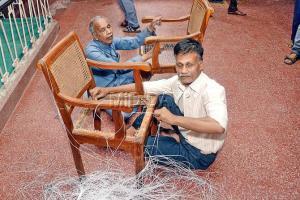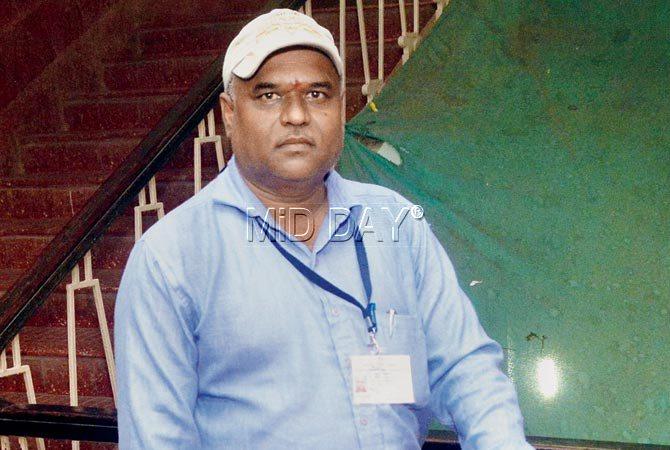A 28-year-old furniture cooperative helmed by the visually impaired is ensuring that all state government-run agencies never run out of chairs

Visually impaired artisan Dinesh Mahajan, who has an MA in political science from Ahmednagar, was roped in by Shaikh Sayyed Nahnu (behind) into chair caning after his STD booth business hit a slump. Pics/Sayyed Sameer Abedi
On a damp weekday afternoon, 63-year-old Shaikh Sayyed Nahnu and a group of artisans are sipping tea at a stall near Mantralya. Once done, they’ll head to the first floor of the Maharashtra government’s headquarters, to resume work. Their job involves meticulously threading individual strands of cane into holes located around the frame of the wooden chair. “My job is to oversee the work done by the artisans. I have to run my hand over the chairs and other furniture to understand what is lacking or remains to be done,” he says, having spent decades perfecting the art of chair caning.
ADVERTISEMENT
Nahnu is visually impaired, and so are 90 per cent members of the Maharashtra Andha Audyogik Utpadak Sahakari Sanstha (Maryadit), a Maharashtra-based cooperative society that provides employment to 217 people. Founded in the city by Nahnu in 1990, the organisation looks after the maintenance job right from re-caning of chairs, furniture, repairing, polishing and even manufacturing new furniture at all state government-run institutions, including the University of Mumbai, BMC, Bombay High Court, sessions court, sales tax, excise and even the police department. Every year, their licence is renewed.

Dattatreya Suttar
The need to be independent
The workers earn anywhere between Rs 10,000 and R15,000 a month. The tasks depend on the demand. “The process of re-caning a chair, is simple. It’s akin to knitting a sweater. But the challenge for us is to ensure we don’t go wrong with the count of the pre-drilled holes in the chair. One chair has roughly 30-35 holes. Any mistake in the number can disrupt the pattern,” says Nahnu, who trains all members at the organisation. Often, his job extends well beyond the task at hand. “Many of them lack the confidence to step out of home because families are scared to let them out of sight. So, the job begins with convincing them,” says Nahnu, who was born in Nanded, but later moved to Mumbai to study at Tardeo’s Happy Home and School for the Blind.
Later, he graduated in literature from Elphinstone College. He also worked as an announcer for the Indian Railways before quitting the job to start the cooperative with 50 other students. “I had a burning desire to do something for the community of blind people because I know how hard it is. It’s even harder when one turns blind later in life. We also have youth like that in the organisation,” he says.
To start the cooperative, he sought recourse in the skills he had learnt as a student. “I was barely 10 when I learnt chair caning. It was one of the ‘blind trades’ one learnt, but came in handy,” he says. It took him 10 years to start the cooperative — right from finding enough people and submitting requisite documents. “Fortunately, 10 MLAs supported the cause and helped us get the status of a cooperative,” he says. Since then, they have continued to provide services without halts.
Finding an alternative
Like Nahnu, many are well-educated. Dinesh Mahajan, another artisan in the group, has an MA in political science from Ahmednagar. He now lives with his wife and two sons in Vasai. Back in the day, Mahajan used to run an STD booth, but with the advent of cellphones, he had to shut shop. “Sayyad bhai has been a friend for many years. When he found out that I didn’t have a source of income, he asked me to join,” he says. He started off with chair caning, a task that now takes him barely three hours. Being educated and adept in numbers, Mahajan also looks after the paperwork with the help of the sighted in the group. “While I am well versed with the technical part of the job, these days I look into documentation work to ensure all workers get paid, legalities of the contract are followed etc. We ensure everything from the government’s side is documented on paper to avoid any ambiguities,” he says. Recruitment is through word of mouth and interest in the job. Dattatreya Suttar, who is one of the sighted members in the organisation and looks after the upholstery section, says not a day goes by when the geometric consistency of his visually impaired counterparts does not amaze him. “There are times, when I miss out on details, but nothing slips their attention,” he says. For now, Nahnu and his team have wrapped up their task at Mantralaya. Their next session is at Sion Hospital. “We have 30 members waiting there,” he says, before signing off.
Catch up on all the latest Mumbai news, crime news, current affairs, and also a complete guide on Mumbai from food to things to do and events across the city here. Also download the new mid-day Android and iOS apps to get latest updates
 Subscribe today by clicking the link and stay updated with the latest news!" Click here!
Subscribe today by clicking the link and stay updated with the latest news!" Click here!






